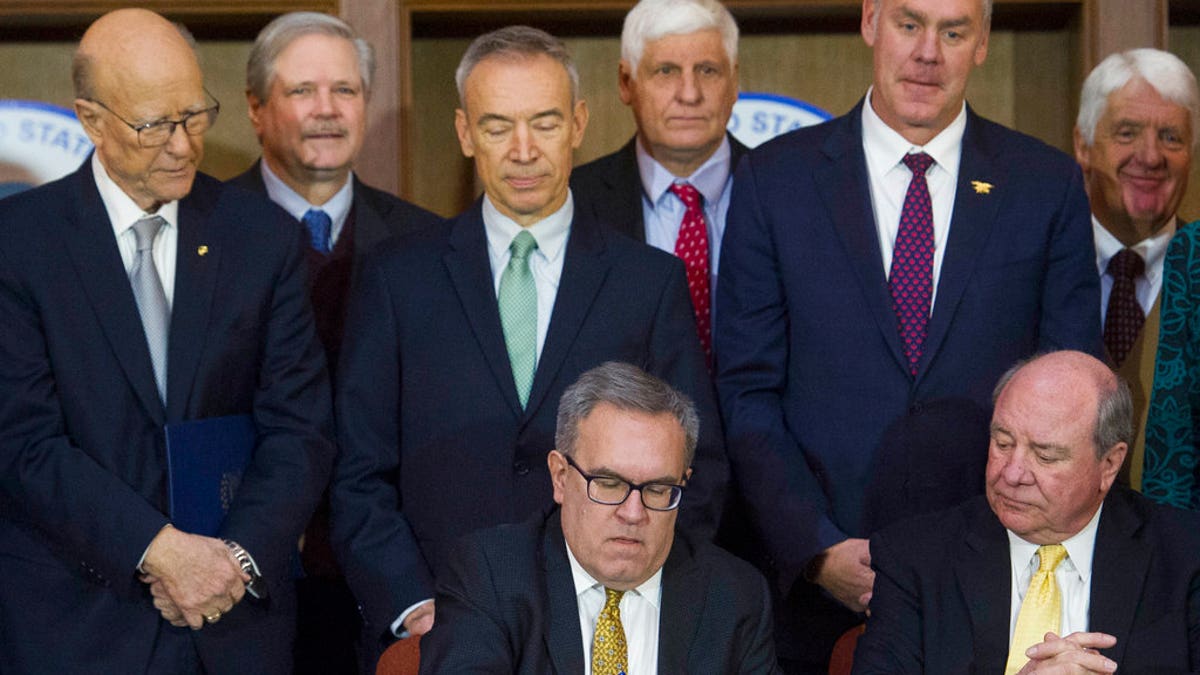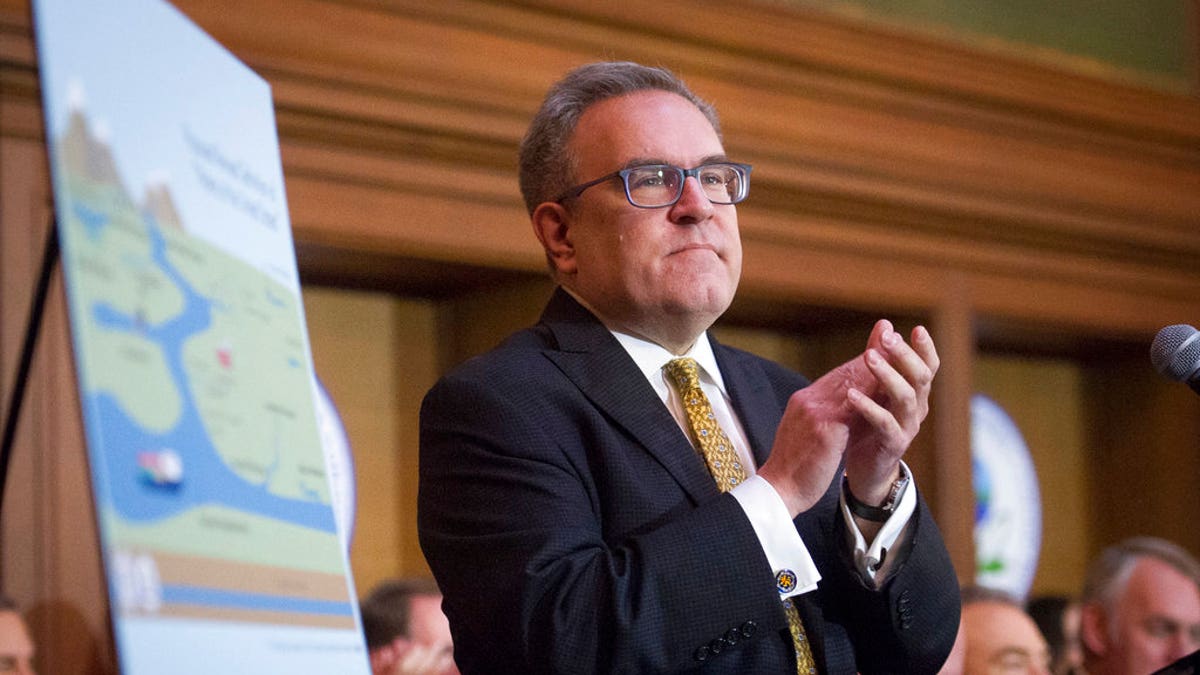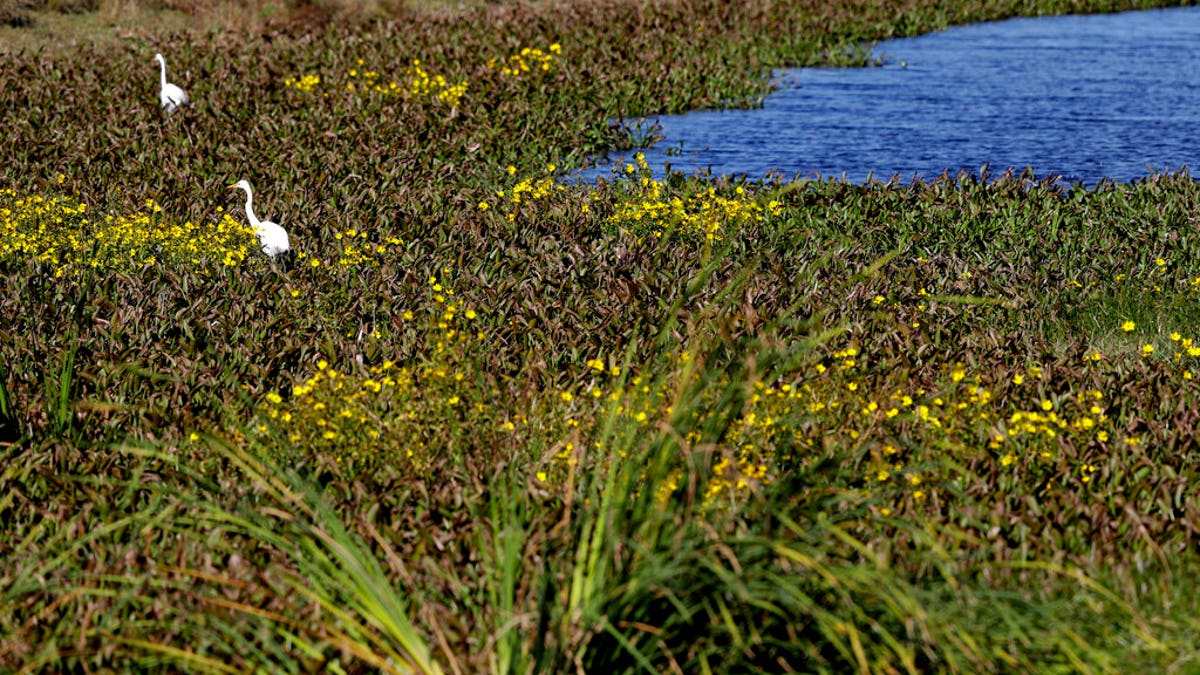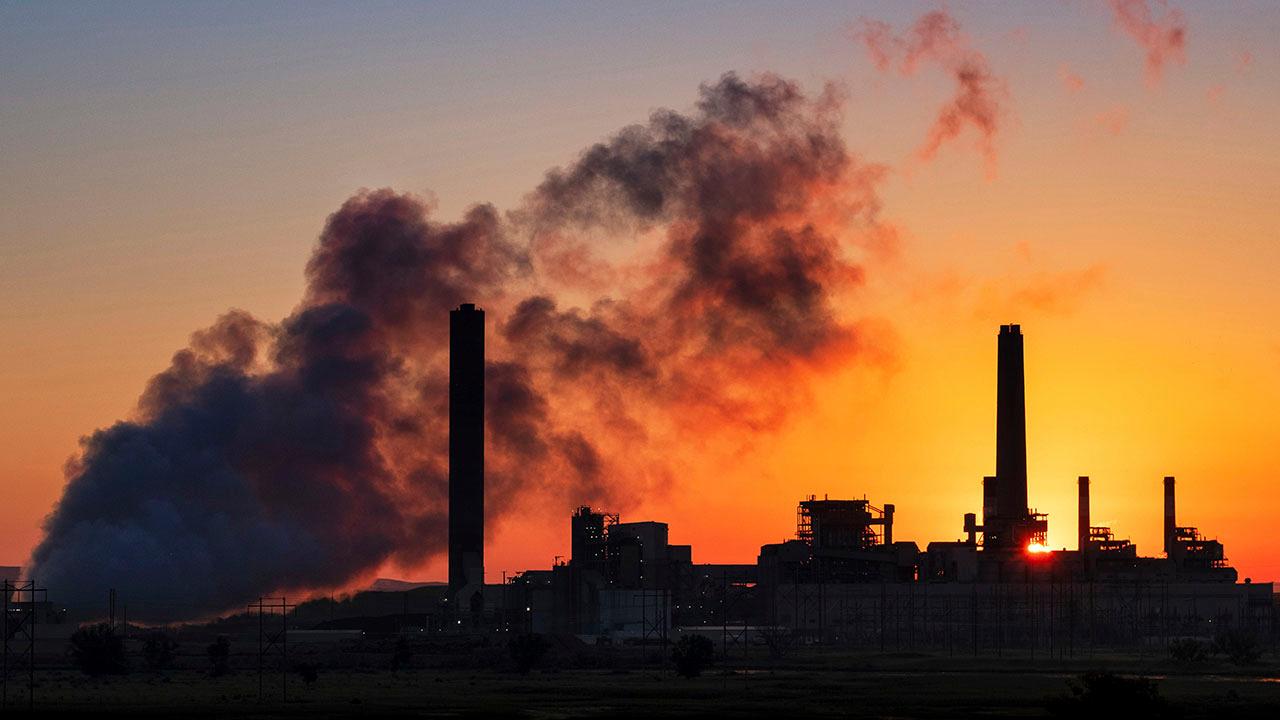
Acting EPA Administrator Andrew Wheeler, seated left, signing an order withdrawing federal protections for countless waterways and wetlands, as Assistant Secretary of the Army for Civil Works Rickey "RD" James, seated right, looks on, at EPA headquarters in Washington on Tuesday. Among those looking on from behind are Senate Agriculture Committee Chairman Pat Ross, R-Kansas, left, and Secretary of the Interior Ryan Zinke, second from right. (AP Photo/Cliff Owen)
The Trump administration on Tuesday took some of the final steps to end an Obama-era policy that placed thousands of miles of waterways under federal regulation, clearing the way for new economic development even as environmental activists have promised legal challenges.
The Obama administration had categorized small streams and tributaries -- as well as creeks, washes, ditches and ponds that exist only during rains -- as "waters of the United States" that were subject to federal jurisdiction.
However, the Trump administration, which has long characterized that policy as an overreach, is now set to restrict federal oversight primarily to major waterways and wetlands connected to another federally protected waterway.
Trump issued an executive order in February 2017 entitled “Restoring the Rule of Law, Federalism, and Economic Growth by Reviewing the ‘Waters of the United States’ Rule" that started the process of rolling back the Obama policy.
TRUMP, IN 2017, SAYS KILLING OBAMA WATER RULE WILL HELP CREATE MILLIONS OF JOBS
Under federal administrative law, the Environmental Protection Agency (EPA) must now commence a 60-day period for congressional review and public comment before the non-emergency policy change becomes active.
The EPA said in a press release Tuesday the new policy would be published soon in the Federal Register, kickstarting that 60-day clock. Environmental groups have floated legal challenges to the Trump proposal, which could argue that the administration failed to consider all relevant evidence or risks exposing people to harm.

Acting Environmental Protection Agency administrator Andrew Wheeler speaking after signing an order withdrawing federal protections for countless waterways and wetlands at EPA headquarters in Washington on Tuesday. (AP Photo/Cliff Owen)
"Unlike the Obama administration's 2015 definition of 'waters of the United States,' today’s proposal contains a straightforward definition that would result in significant cost savings, protect the nation’s navigable waters, help sustain economic growth, and reduce barriers to business development," the EPA said.
“For the first time, we are clearly defining the difference between federally protected waterways and state protected waterways," EPA Acting Administrator Andrew Wheeler said in the release. "Our simpler and clearer definition would help landowners understand whether a project on their property will require a federal permit or not, without spending thousands of dollars on engineering and legal professionals.”
House Minority Leader Nancy Pelosi, D-Calif., was far from pleased. “The President’s Dirty Water Rule will pollute and poison the clean drinking water of tens of millions of families and communities. Yet again, this Administration has sold out our children to further enrich its big corporate polluter friends,” she said.
Cabinet chiefs and GOP lawmakers celebrated the new approach alongside farm and business leaders.

A cow in the grass along Valhalla Pond in Riverview, Fla., on Tuesday. (AP Photo/Chris O'Meara)
"When you have uncertainty and overreach it makes it incredibly difficult to build American homes," Gerald Howard, the CEO of the National Association of Home Builders, said of the Obama administration's interpretation of the water rules.
The Obama-era water protections were "always about the federal government getting more control over our water and our lives," said Rep. Sam Graves, a Republican and farmer from Missouri, and one of about a dozen GOP members of Congress at Tuesday's event at the headquarters of the Environmental Protection Agency.
"I want to thank him for keeping that promise," Graves said, referring to Trump.
"Thank you, Mr. President, for giving us the Christmas present of a lifetime," the president of the American Farm Bureau Federation, Zippy Duvall, told reporters.
The rollback comes on the heels of other major moves by the Trump administration to reduce environmental regulations. On Thursday, the Interior Department proposed easing rules on oil and gas drilling for millions of acres of range in the West.
In an exclusive interview with Fox News' "Hannity" on Monday, Trump senior adviser and son-in-law Jared Kushner pointed to the news that the U.S. this week became a net oil exporter for the first time in 75 years as proof that the policies have been working.
"Nobody really saw a lot of these numbers coming, in terms of the oil exports and how we were going to make America an energy-independent country, but we’ve accomplished that, and that’s been through a lot of great work of a lot of the Cabinet secretaries, but really the leadership of the president, to make that happen," Kushner told Sean Hannity.

Sen. Lisa Murkowski, R-Alaska, gesturing towards Acting EPA Administrator Andrew Wheeler, center, and Assistant Secretary of the Army for Civil Works Rickey "RD" James, after Wheeler signed an order withdrawing federal protections for countless waterways and wetlands. (AP Photo/Cliff Owen)
Environmental groups called the proposed overhaul of federal water protections one of the biggest attacks ever on the aims of the 1972 Clean Water Act, the foundational U.S. water protection law.
The new Trump administration proposal would have a sweeping impact on how the country safeguards the nation's waterways, scaling back not just a 2015 Obama administration interpretation of federal jurisdiction, but also how federal agencies enforce the 1972 Clean Water Act.
"The Trump administration has just given a big Christmas gift to polluters," said Bob Irvin, president of the American Rivers environmental nonprofit.
Interior Secretary Ryan Zinke, also attending the ceremony for the regulatory changes, told the farmers and others attending that the proposal "doesn't remove any protection."
He continued, "It puts the decision back where it should be, the people that work the land, that hunt, that own the land."
ZINKE, OTHER CABINET OFFICIALS IN THE CROSSHAIRS AS DEMS VOW INVESTIGATIONS
Environmental groups have said the kind of isolated wetlands, rain-fed streams and often dry washes that would lose federal protections also help buffer communities from the worsening impacts of drought, floods and hurricanes under climate change, and have been vital for wildlife.
Jan Goldman-Carter of the National Wildlife Federation said the move would leave waterways more vulnerable to destruction by developers and farmers or to oil spills, fertilizer runoff and other pollutants. Wheeler said there was no firm data on what percentage of waterways would lose protections.

A pair of egrets along Valhalla Pond, in Riverview, Fla., on Tuesday. (AP Photo/Chris O'Meara)
The Trump administration looked chiefly at court rulings rather than environmental impacts in redoing the regulations, said David Ross, assistant EPA administrator for water.
Ross specified the administration did not dwell on any role that the waterways play in mitigating the effects of climate change.
"We didn't do climate modeling," he said of the proposed rollbacks. "It's a legal policy construct informed by science."
Fox News' Jason Donner and The Associated Press contributed to this report.





